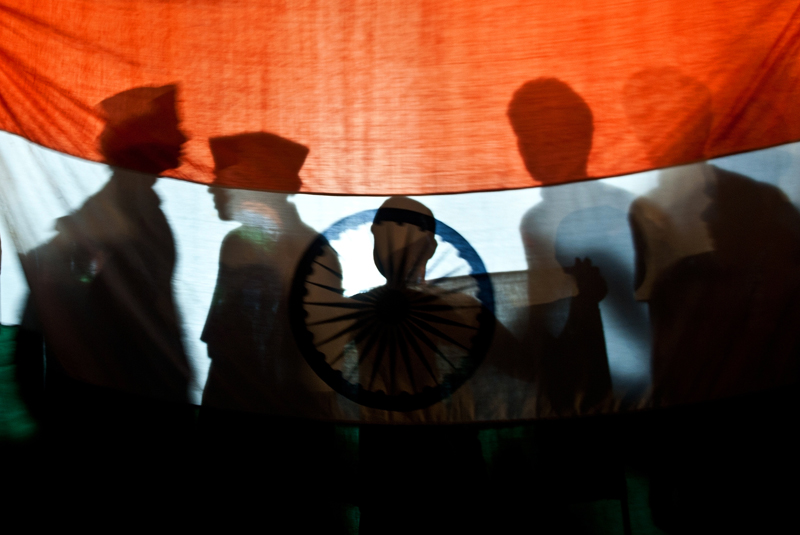By Sohini Ghosh:
We inhabit a polarised age, marked by intolerance and coercive tactics to get what we want. But, this remarkable punch of qualities that we have imbibed so effortlessly is no joke now. It is invading us, our fragile fabric of a society, stretching the thin veil of tolerance that it wears with such great effort.

Nationalism has become much of a misconstrued word of late. Everything can be erased in the name of nationalism and our fundamental rights made conveniently revocable, all in the name of ‘respecting the institution and ideals’Â that this great nation stands for. A nation that can’t bother itself with the millions deprived of electricity, clean water, decent living conditions, food grains, security against anti- state agents, deplorable sanitation facilities and flailing economy, to name a few, can definitely bother itself to arrest a man who didn’t wish to stand up for the 52 second long national anthem, throw a cartoonist in the confines of a jail for supposedly making anti-nationalist cartoons of and definitely send artists to exile for disrobing Bharat Mata on canvas while being his artistic expressive self. You ask why? Well, because it offended our nationalistic sentiments that we clutch so dearly to.
What we fail to do is to question. Question ourselves, why is it necessary to stand-up when the national anthem is played if we don’t wish to. Why is it necessary to be forced to pay homage to the spirit of nationalism if the state of affairs in your country oft leaves you disillusioned? Because, this society is a cruel institution that accepts conformity as its guru dakshina for the plethora of laws that have been put in place to safeguard the nation’s integrity and dignity. Oddly, we are part of the largest democracy. It is equally odd to note how vulnerable we have let ourselves become, with a lot of manipulated sentiments. It has been repeatedly emphasised how important nationalism is to our fundamental being, to exert ourselves as Indians first, to let our nationality define us first, above everything else.
Questioning nationalism has gradually been reduced to a criminal offence, as can be seen with a brief glance at this recent news making rounds of the dailies:
“A youth from Peroorkada (Kerala) was arrested on Wednesday by the police on charges of showing disrespect to the national flag and the national anthem.
The police said Salman, 25, and his six friends, including two women, had showed disrespect to the national anthem while it was being played inside a movie theatre in the city on August 18.
This incident comes just days after a student was arrested in Karwar, Karnataka for similar charges. The Kumta police had arrested Jabeer Khan, a student for allegedly forwarding a message, that according to the complainant, mocked the National Anthem and India.”
What does this tell us about ourselves? It merely emphasises how we are exposing ourselves to be the subject of ridicule with such vile propaganda of a twisted version of ‘nationalism’. There is a well demarcated line separating seditious or anti-nationalistic acts from mere acts of exercising a personal choice while respecting our fundamental rights. But for some inexplicable reason, the line is thinning slowly yet steadfastly. The laws that were put in place to safeguard the sanctity of this nation are repeatedly (deliberately too, perhaps?) being misinterpreted with abandon, similar to an act from a Shakespearean play.
In this age of contravention, certain demagogues hold the privilege of being the star campaigner for by-elections to assembly seats, re-establishing our faith in polarised politics ergo. The guilty go unpunished for such acts of blasphemy while the others live in the fear of their basic rights being violated – all to ascertain a false sense of nationalism.
With a government at the centre being run by few hard-liners and preachers of hindutva, that has been strongly supportive of right wingers like Shiv Sena over the years, it is hard to trust a fair interpretation and protection of our very own opinions that makes each individual what they are, because laws are a matter of judicial interpretation – a judicial system which isn’t acting as independently as an institution it was supposed to be, theoretically, to say the least. The Prevention of Insults to National Honour Act,1971 is an act of the Parliament of India which prohibits desecration of or insult to the country’s national symbols including the flag, map, constitution, and anthem. ‘Desecration’ literally translates to ‘Blasphemous behaviour; the act of depriving something of its sacred character’ and despite the obvious, it has been made clear time and again how raw and vulnerable we have been left.